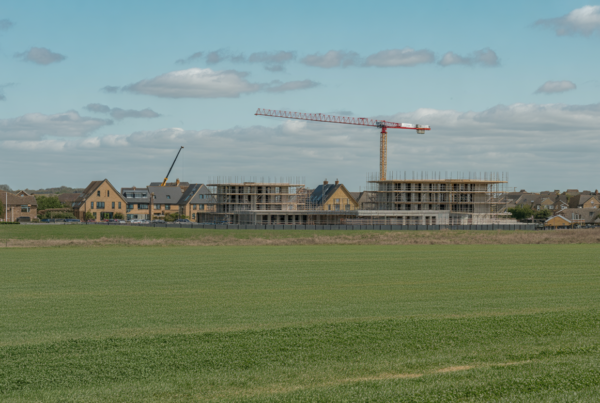In the ever-volatile landscape of the UK property market, the winds of change have blown steadily since the end of 2021, when the Bank of England Base rate embarked on a trajectory from its historic low of 0.1% to its current perch at 5.25% as of June 2024. This surge, including a formidable 3% increase over 18 months, sent ripples through the property development sector, leaving developers grappling with a myriad of challenges.
First and foremost among these challenges are the escalating financial costs. With interest rates soaring, borrowing money becomes notably more expensive. This hike not only constricts developers’ borrowing capacity but can also leave an equity gap that needs to be filled.
Picture a fixed-size pie chart when thinking about a gross development loan. Then think of the loan tranches as slices. If the projected interest slice expands by x%, the land loan/day 1 slice must decrease by the same amount, leaving developers with the difficult task of sourcing additional equity or scaling back their plans.
The repercussions of this are profound, extending beyond the balance sheets of developers. A reduction in development activity not only stifles economic growth but also exacerbates the already acute housing shortage, further complicating the quest for affordable housing.
Adding to developers’ woes, lenders continue to require the same minimum project profit margins as before the Interest rate hikes. Even if developers manage to bridge the equity gap, they risk facing rejection from lenders unwilling to compromise on profit thresholds, resulting in stagnant projects that further strain the supply-demand equilibrium.
The dynamics of land prices add yet another layer of complexity. While one might expect land prices to mirror fluctuations in finance costs, the reality proves more stubborn. Land values, with their inherent inertia, often lag behind changes in the financial landscape, leaving developers grappling with a funding gap between the assumed and actual land values.
Director Jack Bristow added ‘Navigating a turbulent sea of uncertainty demands a strategic approach to development funding. Stress-testing assumptions, understanding financial covenants, and proper financial modelling are among the prudent measures developers must undertake to weather the storm.’
Amid these challenges, however, there are glimmers of hope. Despite the rollercoaster ride of interest rates, lenders have, for the most part, extended a helping hand to borrowers, granting them additional leeway and time to navigate the funding hurdles.
As the market tentatively inches towards stability, buoyed by the Bank of England’s decision to hold the base rate steady, cautious optimism pervades the real estate landscape. Market pundits anticipate a potential small reduction in interest rates over the summer, offering a ray of hope for developers weary of the financial tightrope they tread.
Yet, amidst the anticipation of interest rate cuts, developers would do well to heed the wisdom of prudence. In an era of global uncertainty, where the ripples of distant events can reverberate across borders, diligent risk management remains the cornerstone of sustainable development practices.
In conclusion, while the journey ahead for property developers certainly has challenges, it is also marked by opportunities for resilience and growth. By adopting a strategic approach to funding and remaining vigilant in the face of uncertainty, developers can navigate the choppy waters and emerge stronger on the other side.
Structured Property Finance Specialists:
J3 Advisory is a specialist debt advisory that focuses on all aspects of real estate lending, including development finance, bridging loans and many other aspects of commercial property finance.
Good advice starts by understanding the underlying fundamentals of a project before giving advice. It is only then that a facility can be structured that is fit for purpose. For this reason information sharing is key, and the direct result is more successful outcomes.
For more information on any of the products that we offer or to discuss your funding requirements, please contact us on 0203 096 0718
About the Author

Jack Bristow
Director
Over the past 10 years, Jack’s career has transcended across insurance, finance and sport. Jack established J3 with James and Johnny to provide property professionals with forward-thinking advice on debt structures coupled with insurance, primarily latent defect. He has a reputation for cultivating strong relationships with lenders, insurers and developers alike through his honest and direct approach.





